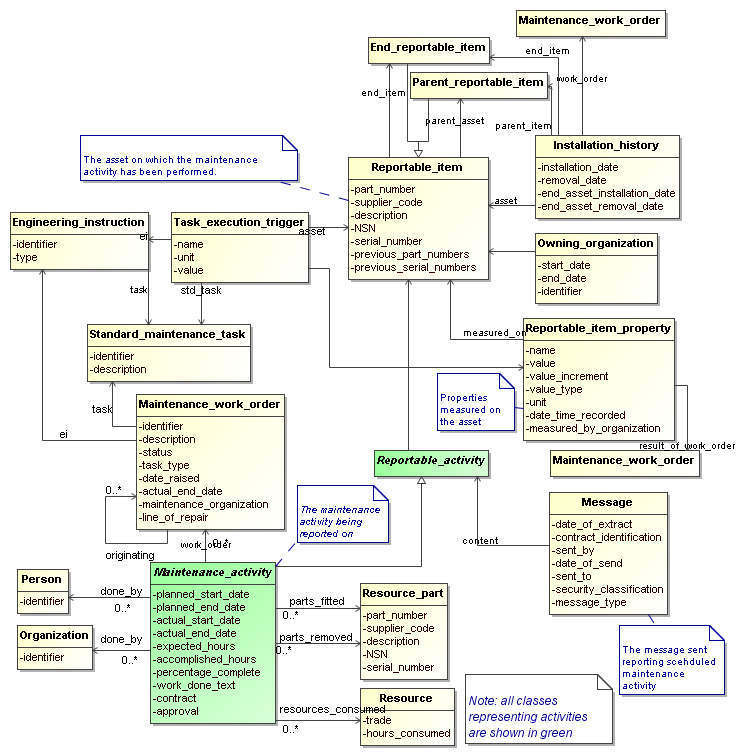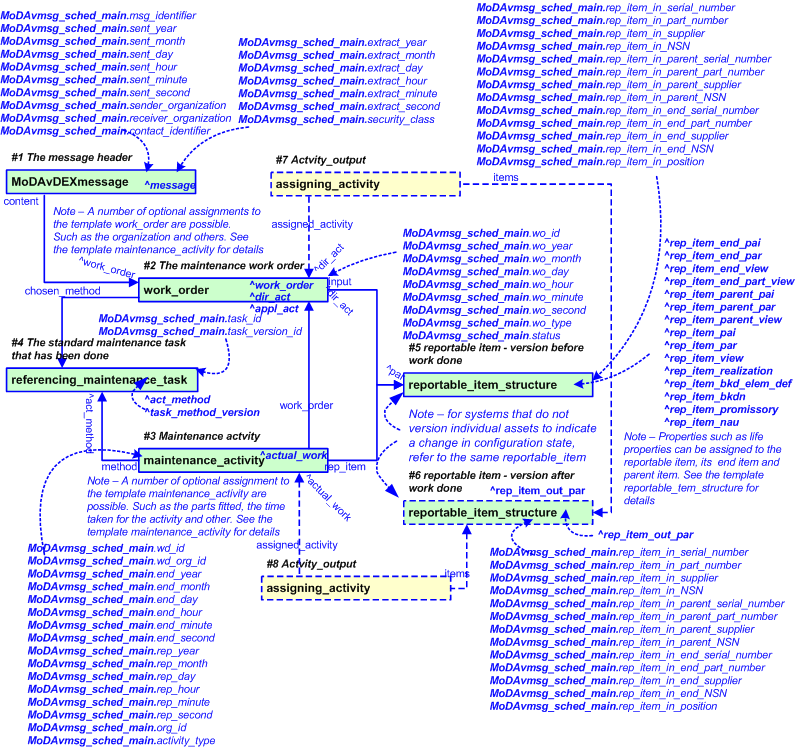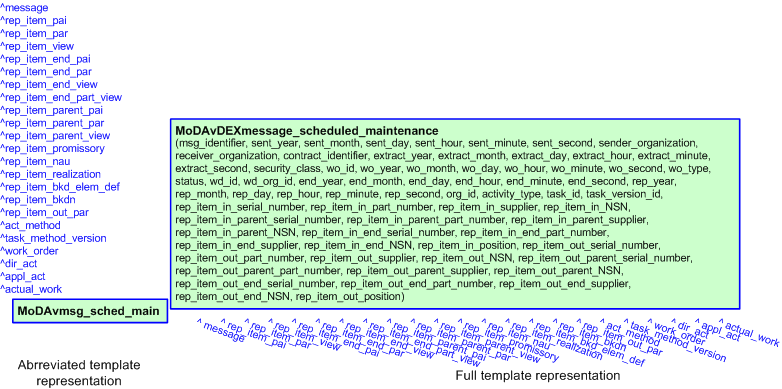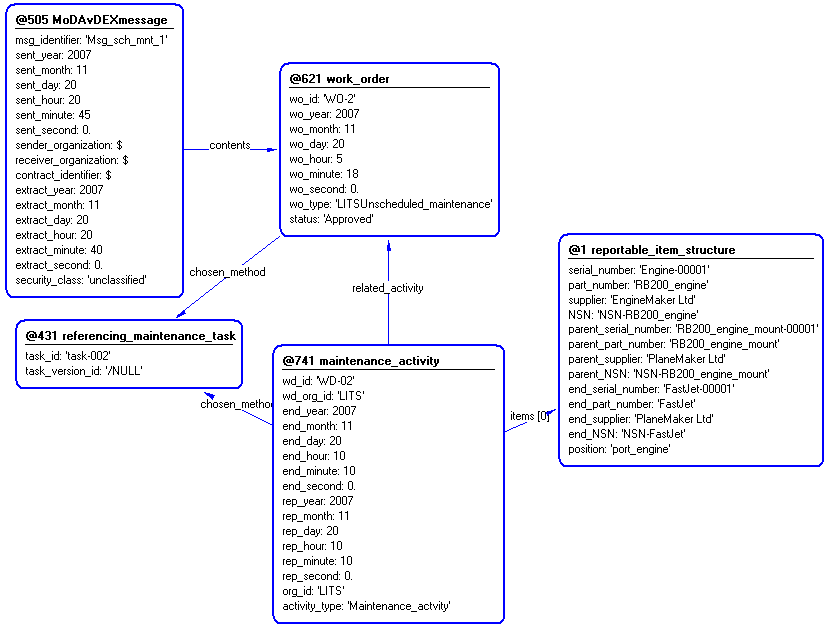Template:— MoDAvDEXmessage_scheduled_maintenance (MoDAvmsg_sched_main)
Context:— MoDAvDEX |
Date: 2008/03/12 22:23:29
Revision: 1.18
|
This section specifies the template MoDAvDEXmessage_scheduled_maintenance.
NOTE
The template has been defined in the context of
MoDAvDEX.
Refer to the business context for details of related templates.
NOTE
An explanation of a template and the associated instantiation path is
provided in the
Template overview
section.
This template describes how to represent a message reporting a scheduled maintenance activity.
Scheduled maintenance messages represent a record of a scheduled maintenance activity
undertaken. The messages are triggered when a work order for scheduled maintenance is
raised and when it is completed. Note that it is the same work order being referenced in
each message with progressively more information about the work done exchanged.
The EXPRESS-G diagram in
Figure
2
shows the templates and EXPRESS entities that are required
to represent the template
"MoDAvDEXmessage_scheduled_maintenance".
The text highlighted in blue shows the template parameters.
Figure 2
shows the templates required to represent scheduled maintenance.
The templates shown in yellow in Figure 2 are
standard OASIS template. Those shown in light green are business templates developed
specifically for the MoDAvDEX context.
Further details of how to represent scheduled maintenance using ISO 10303 239 PLCS is
provided in
Aviation Maintenance DEX: Representing a maintenance work order - PLCS representation.
The following mandatory templates are shown in Figure 2
and used to represent different aspects of the scheduled maintenance activity.
- Template: #1 MoDAvDEX.MoDAvDEXmessage
- The template: #1 MoDAvDEX.MoDAvDEXmessage
(Figure 2) is used to
represent the message meta data.
- Template: #2 MoDAvDEX.work_order
- The template: #2 MoDAvDEX.work_order
(Figure 2) is used to
represent the maintenance work order.
- Template: #3 MoDAvDEX.maintenance_activity
- The template: #3 MoDAvDEX.maintenance_activity
(Figure 2) is used to
represent the record of the activity that has been performed.
- Template: #4 MoDAvDEX.referencing_maintenance_task
- The template: #4 MoDAvDEX.referencing_maintenance_task
(Figure 2) is used to
identify the standard maintenance task that has been done.
- Template: #5 MoDAvDEX.reportable_item_structure
- The template: #5 MoDAvDEX.reportable_item_structure
(Figure 2) is used to
represent the reportable item and, if appropriate, its end item, parent or higher
assembly and position within the end item. The template also allows the properties,
such as life properties, of
the reportable item, the end and parent item, to be recorded.
- Template: #6 MoDAvDEX.reportable_item_structure
- The template: #6 MoDAvDEX.reportable_item_structure
(Figure 2) is used to
represent the reportable item and, if appropriate, its end item, parent or higher
assembly and position within the end item. The template also allows the properties,
such as life properties, of
the reportable item, the end and parent item, to be recorded.
This is used where the reportable item is versioned after work has been done.
If the Engineering and asset management system does not version assets, then
only use template #5.
- Templates: #7,#8 assigning_activity
- The templates: #7,#8 assigning_activity
relate the template: #2 MoDAvDEX.work_order and
template: #3 MoDAvDEX.maintenance_activity
respectively to the template: #6 MoDAvDEX.reportable_item_structure,
the reportable item version after the work has been done. If he Engineering and asset management system does
not version assets, then
templates: #7,#8 are not used.
Figure 2 — An EXPRESS-G representation of the Information model for MoDAvDEXmessage_scheduled_maintenance
The graphic for the template to be used in other EXPRESS-G diagrams
is shown in Figure
3
below.
Figure 3 — The graphical representation of the MoDAvDEXmessage_scheduled_maintenance template
The following input parameters are defined for this template:
The identifier of the message.
Calendar_date year_component of the date that the message was sent.
Calendar_date month_component of the date that the message was sent.
Calendar_date day_component of the date that the message was sent.
Local_time hour_component of the date and time that the message was sent.
Local_time minute_component of the date and time that the message was sent. This
parameter is optional. If not given, it will remain unset.
Local_time second_component of the date and time that the message was sent. This
parameter is optional. If not given, it will remain unset.
The name or identifier of the sending organization.
The name or identifier of the receiving organization.
The name or identifier of the contract.
Calendar_date year_component of the date that the information in the message was
extracted from the sending system.
Calendar_date month_component of the date that the information in the message
was extracted from the sending system.
Calendar_date day_component of the date that the information in the message was
extracted from the sending system.
Local_time hour_component of the date that the information in the message was
extracted from the sending system.
Local_time minute_component of the date that the information in the message was
extracted from the sending system. This parameter is optional. If not given, it will remain
unset.
Local_time day_component of the date and time the message is extracted. This
parameter is optional. If not given, it will remain unset.
The following classes and their sub-classes can be used:
classifications: [ModAvDEX_Security_classification]![[warning:]](../../../../../../images/dex/warning.gif) Error RDL4: The URI urn:plcs:rdl:LITS is not listed in dexlib/data/refdata/rdl_index.xml
Error RDL4: The URI urn:plcs:rdl:LITS is not listed in dexlib/data/refdata/rdl_index.xml
wo_id (Default=/NULL,Type='STRING')
The identifier of the work_order.
Calendar_date year_component of date the work order is issued.
Calendar_date month_component of date the work order is issued.
Calendar_date day_component of date the work order is issued.
Local_time hour_component of the date and time the work order is issued.
Local_time month_component of the date and time the work order is issued. This
parameter is optional. If not given, it will remain unset.
Local_time second_component of the date and time the work order is issued. This
parameter is optional. If not given, it will remain unset.
The following classes and their sub-classes can be used:
classifications: [Maintenance_activity]![[warning:]](../../../../../../images/dex/warning.gif) Error RDL1: The class Maintenance_activity does not exist in RDL at urn urn:plcs:rdl:std. Check the dexlib/data/refdata/rdl_index.xml
Error RDL1: The class Maintenance_activity does not exist in RDL at urn urn:plcs:rdl:std. Check the dexlib/data/refdata/rdl_index.xml
status (Type='CLASS', Optional)
The status of the work order
The following classes and their sub-classes can be used:
classifications: [ModAvDEX_Approval_status]![[warning:]](../../../../../../images/dex/warning.gif) Error RDL4: The URI urn:plcs:rdl:LITS is not listed in dexlib/data/refdata/rdl_index.xml
Error RDL4: The URI urn:plcs:rdl:LITS is not listed in dexlib/data/refdata/rdl_index.xml
The identifier of the maintenance activity.
NOTE
This will be the same identifier as the work order.
The name or identifier of the organization owning the identifier of the maintenance activity.
The year component of the date the activity was completed .
The month component of the date the activity was completed .
The day component of the date the activity was completed .
The hour component of the date the activity was completed .
The minute component of the date the activity was completed .
This parameter is optional. If not given, it will remain unset.
The second component of the date the activity was completed .
This parameter is optional. If not given, it will remain unset.
The year component of the date the activity was reported.
The month component of the date the activity was reported.
The day component of the date the activity was reported.
The hour component of the date the activity was reported.
The minute component of the date the activity was reported.
This parameter is optional. If not given, it will remain unset.
The second component of the date the activity was reported.
This parameter is optional. If not given, it will remain unset.
org_id (Type='STRING', Optional)
The name or identifier of the organization that undertook the activity.
activity_type (Default=Maintenance_activity,Type='CLASS', Optional)
The name of the class in the reference data library defining the type of the activity
performed.
The following classes and their sub-classes can be used:
classifications: [Maintenance_activity]![[warning:]](../../../../../../images/dex/warning.gif) Error RDL1: The class Maintenance_activity does not exist in RDL at urn urn:plcs:rdl:std. Check the dexlib/data/refdata/rdl_index.xml
Error RDL1: The class Maintenance_activity does not exist in RDL at urn urn:plcs:rdl:std. Check the dexlib/data/refdata/rdl_index.xml
The task version identifier.
The serial_number of the reportable item that is input to the activity.
The part_number of the reportable item that is input to the activity.
The supplier of the reportable item that is input to the activity.
The NSN of the reportable item that is input to the activity.
The serial_number of the input reportable item's parent item.
The part_number of the input reportable item's parent item.
The supplier of the input reportable item's parent item.
The NSN of the input reportable item's parent item.
The serial_number of the input reportable item's end item.
The part_number of the input reportable item's end item.
The supplier of the input reportable item's end item.
The NSN of the input reportable item's end item.
The position in which the reportable item is fitted.
The serial_number of the reportable item that is output from the activity.
The part_number of the reportable item that is output from the activity.
The supplier of the reportable item that is output from the activity.
The NSN of the reportable item that is output from the activity.
The serial_number of the reportable item's parent item.
The part_number of the reportable item's parent item.
The supplier of the reportable item's parent item.
The NSN of the reportable item's parent item.
The serial_number of the output reportable item's end item.
The part_number of the output reportable item's end item.
The supplier of the output reportable item's end item.
The NSN of the output reportable item's end item.
The position in which the reportable item is fitted.
The following reference parameters are defined for this template:
Allow the
Message
entity instantiated in this path to be referenced when this template is used.
Note: The
Message
entity can be referenced in a template path by:
%^target = $MoDAvDEXmessage_scheduled_maintenance.message%
where
target
is the parameter to which the
Message
is bound.
Allow the
Product_as_individual
entity instantiated in this path to be referenced when this template is used.
%^target = $MoDAvDEXmessage_scheduled_maintenance.rep_item_pai%
Allow the
Product_as_realized
entity instantiated in this path to be referenced when this template is used.
%^target = $MoDAvDEXmessage_scheduled_maintenance.rep_item_par%
%^target = $MoDAvDEXmessage_scheduled_maintenance.rep_item_view%
Allow the
Product_as_individual
entity instantiated in this path to be referenced when this template is used.
%^target = $MoDAvDEXmessage_scheduled_maintenance.rep_item_end_pai%
Allow the
Product_as_realized
entity instantiated in this path to be referenced when this template is used.
%^target = $MoDAvDEXmessage_scheduled_maintenance.rep_item_end_par%
%^target = $MoDAvDEXmessage_scheduled_maintenance.rep_item_end_view%
Allow the
Part_view_definition
entity instantiated in this path to be referenced when this template is used.
%^target = $MoDAvDEXmessage_scheduled_maintenance.rep_item_end_part_view%
Allow the
Product_as_individual
entity instantiated in this path to be referenced when this template is used.
%^target = $MoDAvDEXmessage_scheduled_maintenance.rep_item_parent_pai%
Allow the
Product_as_realized
entity instantiated in this path to be referenced when this template is used.
%^target = $MoDAvDEXmessage_scheduled_maintenance.rep_item_parent_par%
%^target = $MoDAvDEXmessage_scheduled_maintenance.rep_item_parent_view%
Allow the
Promissory_usage
entity instantiated in this path to be referenced when this template is used.
%^target = $MoDAvDEXmessage_scheduled_maintenance.rep_item_promissory%
Allow the
Next_assembly_usage
entity instantiated in this path to be referenced when this template is used.
%^target = $MoDAvDEXmessage_scheduled_maintenance.rep_item_nau%
%^target = $MoDAvDEXmessage_scheduled_maintenance.rep_item_realization%
%^target = $MoDAvDEXmessage_scheduled_maintenance.rep_item_bkd_elem_def%
Allow the
Breakdown
entity instantiated in this path to be referenced when this template is used.
Note: The
Breakdown
entity can be referenced in a template path by:
%^target = $MoDAvDEXmessage_scheduled_maintenance.rep_item_bkdn%
where
target
is the parameter to which the
Breakdown
is bound.
Allow the
Product_as_realized
entity instantiated in this path to be referenced when this template is used.
%^target = $MoDAvDEXmessage_scheduled_maintenance.rep_item_out_par%
Allow the
Activity_method
entity instantiated in this path to be referenced when this template is used.
%^target = $MoDAvDEXmessage_scheduled_maintenance.act_method%
Allow the
Task_method_version
entity instantiated in this path to be referenced when this template is used.
%^target = $MoDAvDEXmessage_scheduled_maintenance.task_method_version%
Allow the
Work_order
entity instantiated in this path to be referenced when this template is used.
Note: The
Work_order
entity can be referenced in a template path by:
%^target = $MoDAvDEXmessage_scheduled_maintenance.work_order%
where
target
is the parameter to which the
Work_order
is bound.
Allow the
Directed_activity
entity instantiated in this path to be referenced when this template is used.
%^target = $MoDAvDEXmessage_scheduled_maintenance.dir_act%
%^target = $MoDAvDEXmessage_scheduled_maintenance.appl_act%
Allow the
Activity_actual
entity instantiated in this path to be referenced when this template is used.
%^target = $MoDAvDEXmessage_scheduled_maintenance.actual_work%
The instantiation path shown below specifies the entities that are to be
instantiated by the template.
A description of templates and the syntax for the instantiation path is
provided in the
Templates Help/Information section.
/
reportable_item_structure(
serial_number=@rep_item_in_serial_number,
part_number=@rep_item_in_part_number,
supplier=@rep_item_in_supplier,
NSN=@rep_item_in_NSN,
parent_serial_number=@rep_item_in_parent_serial_number,
parent_part_number=@rep_item_in_parent_part_number,
parent_supplier=@rep_item_in_parent_supplier,
parent_NSN=@rep_item_in_parent_NSN,
end_serial_number=@rep_item_in_end_serial_number,
end_part_number=@rep_item_in_end_part_number,
end_supplier=@rep_item_in_end_supplier,
end_NSN=@rep_item_in_end_NSN,
position=@rep_item_in_position)/
%^rep_item_pai = $reportable_item_structure.pai%
%^rep_item_par = $reportable_item_structure.par%
%^rep_item_view = $reportable_item_structure.view%
%^rep_item_end_pai = $reportable_item_structure.end_pai%
%^rep_item_end_par = $reportable_item_structure.end_par%
%^rep_item_end_view = $reportable_item_structure.end_view%
%^rep_item_end_part_view = $reportable_item_structure.end_part_view%
%^rep_item_parent_pai = $reportable_item_structure.parent_pai%
%^rep_item_parent_par = $reportable_item_structure.parent_par%
%^rep_item_parent_view = $reportable_item_structure.parent_view%
%^rep_item_promissory = $reportable_item_structure.promissory%
%^rep_item_nau = $reportable_item_structure.nau%
%^rep_item_realization = $reportable_item_structure.realization%
%^rep_item_bkd_elem_def = $reportable_item_structure.bkdn_elem_def%
%^rep_item_bkdn = $reportable_item_structure.bkdn%
/
reportable_item_structure(
serial_number=@rep_item_out_serial_number,
part_number=@rep_item_out_part_number,
supplier=@rep_item_out_supplier,
NSN=@rep_item_out_NSN,
parent_serial_number=@rep_item_out_parent_serial_number,
parent_part_number=@rep_item_out_parent_part_number,
parent_supplier=@rep_item_out_parent_supplier,
parent_NSN=@rep_item_out_parent_NSN,
end_serial_number=@rep_item_out_end_serial_number,
end_part_number=@rep_item_out_end_part_number,
end_supplier=@rep_item_out_end_supplier,
end_NSN=@rep_item_out_end_NSN,
position=@rep_item_out_position)/
%^rep_item_out_par = $reportable_item_structure.par%
/
referencing_maintenance_task(
task_id=@task_id,
task_version_id=@task_version_id)/
%^act_method = $referencing_maintenance_task.act_method%
%^task_method_version = $referencing_maintenance_task.task_method_version%
/
work_order(
wo_id=@wo_id,
wo_year=@wo_year,
wo_month=@wo_month,
wo_day=@wo_day,
wo_hour=@wo_hour,
wo_minute=@wo_minute,
wo_second=@wo_second,
wo_type=@wo_type,
status=@status,
request='',
input=^rep_item_par,
chosen_method=^act_method)/
%^work_order = $work_order.work_order%
%^dir_act = $work_order.dir_act%
%^appl_act = $work_order.appl_act%
/
MoDAvDEXmessage(
msg_identifier=@msg_identifier,
sent_year=@sent_year,
sent_month=@sent_month,
sent_day=@sent_day,
sent_hour=@sent_hour,
sent_minute=@sent_minute,
sent_second=@sent_second,
sender_organization=@sender_organization,
receiver_organization=@receiver_organization,
contract_identifier=@contract_identifier,
extract_year=@extract_year,
extract_month=@extract_month,
extract_day=@extract_day,
extract_hour=@extract_hour,
extract_minute=@extract_minute,
extract_second=@extract_second,
security_class=@security_class,
content=^work_order)/
%^message = $MoDAvDEXmessage.message%
/
assigning_activity(
role_class_name='Activity_output',
role_ecl_id='urn:plcs:rdl:std',
assigned_activity=^dir_act,
items=^rep_item_out_par)/
/
maintenance_activity(
wd_id=@wd_id,
wd_org_id=@wd_org_id,
end_year=@end_year,
end_month=@end_month,
end_day=@end_day,
end_hour=@end_hour,
end_minute=@end_minute,
end_second=@end_second,
rep_year=@rep_year,
rep_month=@rep_month,
rep_day=@rep_day,
rep_hour=@rep_hour,
rep_minute=@rep_minute,
rep_second=@rep_second,
org_id=@org_id,
activity_type=@activity_type,
directed_activity=^work_order,
rep_item=^rep_item_par,
method=^act_method)/
%^actual_work = $maintenance_activity.actual_work%
/
assigning_activity(
role_class_name='Activity_output',
role_ecl_id='urn:plcs:rdl:std',
assigned_activity=^actual_work,
items=^rep_item_out_par)/
The instance diagram in Figure
4
shows an example of the EXPRESS entities and templates that are instantiated by the template:
/MoDAvDEXmessage_scheduled_maintenance(msg_identifier='Msg_sch_mnt_1', sent_year='2007', sent_month='11', sent_day='20', sent_hour='20', sent_minute='45', sent_second='0', sender_organization='BigAirways Ltd', receiver_organization='AircraftRepairs Ltd', contract_identifier='Ct-1', extract_year='2007', extract_month='11', extract_day='20', extract_hour='20', extract_minute='40', extract_second='0', security_class='unclassified', wo_id='WO-2', wo_year='2007', wo_month='11', wo_day='20', wo_hour='5', wo_minute='18', wo_second='0', wo_type='LITSUnscheduled_maintenance', status='Approved', wd_id='WD-02', wd_org_id='LITS', end_year='2007', end_month='11', end_day='20', end_hour='10', end_minute='10', end_second='0', rep_year='2007', rep_month='11', rep_day='10', rep_hour='10', rep_minute='20', rep_second='0', org_id='LITS', activity_type='Maintenance_actvity', task_id='task-002', task_version_id='/NULL', rep_item_in_serial_number='Engine-00001', rep_item_in_part_number='RB200_engine', rep_item_in_supplier='EngineMaker Ltd', rep_item_in_NSN='NSN-RB200_engine', rep_item_in_parent_serial_number='RB200_engine_mount-00001', rep_item_in_parent_part_number='RB200_engine_mount', rep_item_in_parent_supplier='PlaneMaker Ltd', rep_item_in_parent_NSN='NSN-RB200_engine_mount', rep_item_in_end_serial_number='FastJet-00001', rep_item_in_end_part_number='FastJet', rep_item_in_end_supplier='PlaneMaker Ltd', rep_item_in_end_NSN='NSN-FastJet', rep_item_in_position='port_engine', rep_item_out_serial_number='/NULL', rep_item_out_part_number='/NULL', rep_item_out_supplier='/NULL', rep_item_out_NSN='/NULL', rep_item_out_parent_serial_number='/NULL', rep_item_out_parent_part_number='/NULL', rep_item_out_parent_supplier='/NULL', rep_item_out_parent_NSN='/NULL', rep_item_out_end_serial_number='/NULL', rep_item_out_end_part_number='/NULL', rep_item_out_end_supplier='/NULL', rep_item_out_end_NSN='/NULL', rep_item_out_position='/NULL')/
Figure 4 — Entities instantiated by MoDAvDEXmessage_scheduled_maintenance template
Characterizations
No common characterizations of the template
MoDAvDEXmessage_scheduled_maintenance
have been identified. However, the ISO 10303-239 EXPRESS model
may enable other assignments to the entities instantiated by the template.



